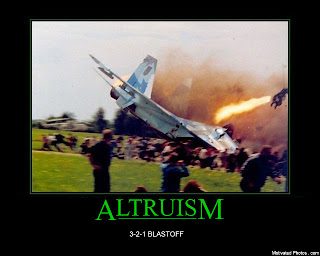Mutual co-operation and harmony between unrelated individuals, animals or human beings has been one of the key problems of evolutionary biology. Jozsef Garay an evolutionary biologist at the Hungarian Academy of sciences, discusses about the altruistic co-operation in animals in his paper 'Cooperation in Defence against a predator'. He writes that the animals which are not the target of the predator help the member of the group which are being attacked to demostrate the altruistic behavior and even may die in the defensive action.
We may have seen the fierce animal chase on television. The lion leaps towards the herd of the Gazelles while the herd instead of protecting their life first, surrounds the young, wounded and the weak even when their own life is in danger. This is a great presentation of the altruistic behavior by the Gazelles. Thus the Gazelles find themselves safe in large numbers, when they live as a group.
In Garay's paper he talks about two animals A and B, and he assumes that a predator can only realistically attack one at a time, then the probability of A being attacked is 1/2 in a single round of predation. So, in a one-shot game, if B is attacked, A’s best strategy is to cut and run, since helping B may result in injury or death.According to him, if the same game is played over and over (that is, if they run the risk of being attacked often, as is the case in real life), then A’s best strategy is to help out B. This might seem incongruous, but it isn’t.
If B dies in the first attack, then A’s probability of being attacked in the next round is 100%! If he has a less than 100% chance of dying by way of helping B in the first attack than he is better off helping B since on the next round he’ll still have only a 50% chance of being attacked. 50% is certainly better than 100%!
The case is true even if B never helps out A. That is, if A is the only Altruistic one in the group, then it is still to his advantage to continue to be altruistic. But, if B also is altruistic then this is all the better for A. Also, B would then enjoy the same benefits as A.
This research shows that having co-operative feeling and the willingness to help others in the animals or humans, increases the probability of their own survival. A bundle of sticks is always diffuclt to break but when the bundle is opened the sticks can be broken easily. Similarly, altruism is the knot for the human unity. And if this knot is opened, there will be no humanity and every man shall lose his values, norms, traditions and ultimately his identity as the broken sticks.
Garay, Jozsef. 2009. “Cooperation in Defence against a predator.” Journal of Theoretical Biology. 257 (2009) 45-51.
Link



